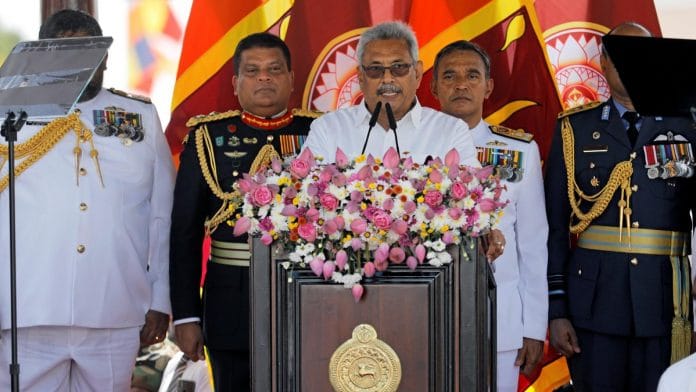One of the first headlines I saw after Sri Lanka’s presidential elections over the weekend summarised how most foreigners would see the outcome: “Strongman Back in Sri Lanka, Raising Fears of Tilt to China.”
Nandasena Gotabaya Rajapaksa, who won the election, has a reputation for being a strongman even within a family of strongmen, so much so that they call him “The Terminator”. His victory brings the Rajapaksa clan back to power. However, while the Rajapaksas have previously benefited from Chinese engagement and the new president will need Beijing’s political support, we should be careful in over-interpreting the “tilt” towards China.
Just as commentators who predicted the collapse of Chinese influence in Colombo after Mahinda Rajapaksa’s electoral defeat in 2015 proved to be wrong, assessments that put Gotabaya’s Sri Lanka into the Chinese camp will turn out to be exaggerated.
Also read: Be it Shavendra Silva or Rajapaksa, Sri Lanka’s love for ‘war criminals’ runs deep
Need for China’s help
What I wrote in 2015 is as applicable today as it was then:
“Sri Lanka’s need for China is anchored in deeper, structural reasons. A small country seeking to protect its autonomy against a large neighbour will attempt to build relations with other powers in order to balance them off against each other. Previous governments in Colombo have engaged the United States, Iran and Pakistan for this reason, before China entered the picture…
In a broader assessment, from Sri Lanka’s perspective, India and China are not good substitutes for each other. India cannot step into China’s shoes and spread billions of dollars in order to buy influence in Sri Lanka. At least not on the same scale. Nor can it as easily overlook human rights reports and the treatment of the island’s Tamil minority. For its part, China cannot move itself into the Indian Ocean and become Sri Lanka’s neighbour. This lack of substitutability gives Colombo the rationale, reason and space for engaging both. Just as its quest for autonomy gives it the motive for hedging, balancing and playing one against the other. None of this has changed after the election.”
Now, it is not wholly incorrect to see Sri Lanka as a part of a larger regional or global game involving China. If Rajapaksa strengthens China’s foothold in the Sri Lankan economy and allows it to build up its maritime presence in the Indian Ocean, then it will alter the balance of power in Beijing’s favour. How likely is this? There are two important angles to consider:
First, the Sri Lankan economy has been sluggish, its currency is depreciating, bad debts are becoming a bigger problem and its tourism sector is in doldrums after the terrorist attacks on Easter this year. In these circumstances, any government in Colombo would seek better economic relations with Beijing, not least because the Indian economy is also in a slowdown. Perhaps, the Rajapaksas will be wiser in their dealings with China after their previous engagement left the Sri Lankan government trapped in debt. In any case, we should expect Gotabaya’s Sri Lanka to offer China a bigger role in its domestic economy.
Second, Gotabaya’s domestic political agenda might leave him in need of Chinese diplomatic and political support at the United Nations and other international fora. During the campaign, for instance, Gotabaya declared that he “would not honour commitments on post-war accountability and reconciliation the current government made to the UN Human Rights Council in 2015”. While the United States and India might not get too worked up about this, the European Union and other countries could introduce measures to censure Sri Lanka or sanction some of its officials.
Beijing’s clout can help the Rajapaksa regime reduce international pressure, if not escape it entirely.
Also read: ‘Like China, India should invest across Indo-Pacific to ensure regional security’
Geographical barriers
For all this, it is unlikely that Gotabaya’s Sri Lanka will go over to the Chinese. Geography is an important reason. Even if Sri Lanka somehow found its gigantic neighbour to the north completely loathsome, it would be suicide to join the ranks of the neighbour’s adversary. Other than the China angle, New Delhi and Colombo enjoy convergence of interests on several important issues, including national security, trade, environment, and so on. The Rajapaksas know that their victory over the Tamil Tigers could not have been achieved without India looking the other way. They cannot thus be unaware of how important good relations with New Delhi are for Sri Lanka’s political stability and internal security.
That’s not all. The Rajapaksas’ sensitivity to Sinhala nationalist sentiment will make them wary of too strong an embrace of China. Sri Lanka has already witnessed a round of backlash against China, and like Myanmar, Pakistan, Maldives and Malaysia, has to craft a careful balance where it can benefit from closer ties with China without becoming its satellite.
So, New Delhi must be watchful but not necessarily more concerned about the China angle in Sri Lanka. What is more worrisome is India’s economic slowdown, which will weaken India’s influence on Sri Lanka as it will elsewhere.
The author is the director of the Takshashila Institution, an independent centre for research and education in public policy. Views are personal.







BRI’s record so far has not been good. Future investments will be more prudently planned on both sides. China does not have money to throw around, gains nothing from leading recipients into debt traps. More than China’s growing influence, we should worry about our declining attractiveness as a country to engage with. We are losing our own tryst with destiny.